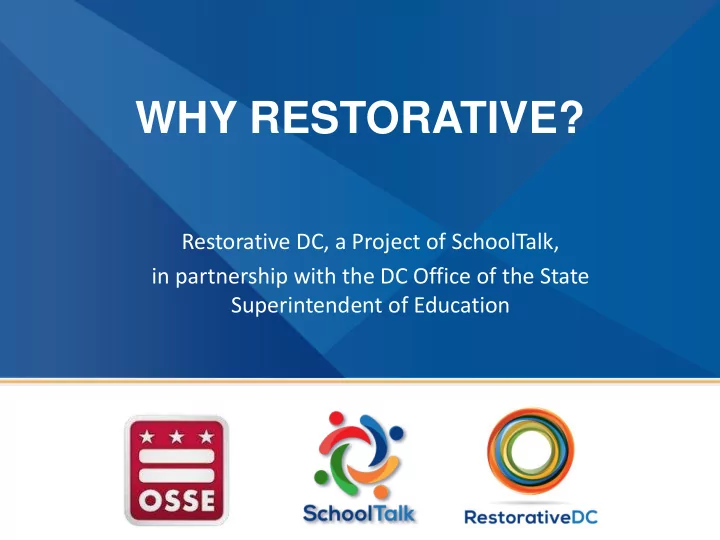

WHY RESTORATIVE? Restorative DC, a Project of SchoolTalk, in partnership with the DC Office of the State Superintendent of Education
OBJECTIVES • Explore the background of and the need for restorative justice • Define the continuum of restorative justice practices • Share first hand experiences of implementing restorative justice practices in DC schools
SCHOOL TO PRISON PIPELINE https://youtu.be/YnGctoUq-fA
CHALLENGES STUDENTS FACE
CHALLENGES STAFF FACE
WHAT IS RESTORATIVE JUSTICE? RESTORATIVE JUSTICE is a culture and set of practices that engages a whole community in building relationships and repair harm through mutual, inclusive dialogue, understanding, and cooperation.
RESTORATIVE PRINCIPLES 3 Pillars of Restorative Justice Accountability Harms & Enlarged circle & Needs of stakeholders Responsibility for resolutions
THE SOCIAL DISCIPLINE WINDOW The underlying premise of RESTORATIVE PRACTICES STRUCTURE rests with the belief that people will make positive changes when those in positions of authority do things with them rather than to them or for them. CONNECTION Wachtel & Costello (2009), The Restorative Practices Handbook, International Institute for Restorative Practices, pg 50
• What laws have been RETRIBUTIVE broken? JUSTICE • Who did it? • What do they deserve? • RESTORATIVE Who has been hurt? • JUSTICE What are their needs? • Whose obligations are these? • Who has a stake in this situation? • What is the appropriate process to involve stakeholders in an effort to put things right?
THE PARADIGM SHIFT RETRIBUTIVE RESTORATIVE Strongest human drive: Strongest human drive: compassion; being in right fear; avoiding consequences relationship Offenses are acts of harm Offenses are defined as arising from and affecting individual violations of laws individuals, relationships, or rules and community Accountability is through a Accountability is through an process in which authorities inclusive process of determine guilt and impose understanding and repairing punishment the harm
THE RESTORATIVE PRACTICES CONTINUUM RESPONSIVE PROACTIVE Affective Dialogue Restorative Restorative Community Statements Circles Questions Conversations Conferencing
A WHOLE-SCHOOL APPROACH Responsive Circles and Intensive Conferences Intervention Restorative Questions Classroom Restorative Culture Interventions Proactive Circles Community Affective Statements Building (universal prevention)
RESTORATIVE DISCIPLINE 1) Acknowledges that relationships are central to building community. 2) Builds systems that address misbehavior and harm in a way that strengthens relationships. 3) Focuses on the harm done rather than only on rule-breaking. 4) Gives voice to the person harmed. 5) Engages in collaborative problem solving. 6) Empowers change and growth. 7) Enhances Responsibility.
WHAT ARE THE RESULTS OF RESTORATIVE PRACTICES REDUCED: • Disciplinary referrals to behavioral staff • Suspensions and expulsions • Amount of instructional time lost to managing challenges in student behavior • Disproportionate referrals for minority students IMPROVED: • Teacher retention and morale • School climate • Engagement of the school community • Student satisfaction and safety
Panelist Questions: Can you please tell us a little bit about … your current work? The impact of RESTORATIVE PRACTICES on your career trajectory and personal life?
Panelist Questions: How were you first introduced to restorative justice practices? What was your initial reaction? Were you skeptical?
Panelist Question: What has implementation looked like in your school?
Panelist Question: What advice would you give to educators who are considering bringing restorative justice practices to their school?
Participants: What do you want to know?
Antonio Carter, Restorative Program Specialist antonio.carter@schooltalkdc.org Leila Peterson, Executive Director leila.peterson@schooltalkdc.org
Recommend
More recommend